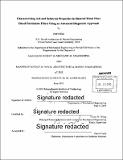Characterizing ash and substrate properties in sintered metal fiber diesel particulate filters using an advanced diagnostic approach
Author(s)
Folino, Paul (Paul John)
DownloadFull printable version (21.58Mb)
Other Contributors
Massachusetts Institute of Technology. Department of Mechanical Engineering.
Advisor
Victor W. Wong.
Terms of use
Metadata
Show full item recordAbstract
In order to comply with strict air emissions regulations, applicable diesel engines are required to have an installed after-treatment device. A diesel particulate filter (DPF) is one of these aftertreatment devices, and it is used to capture hazardous particulate matter (PM) from the engine exhaust stream. Over the lifetime of the DPF, incombustible materials like ash are deposited within the DPF. The presence of ash inhibits the exhaust flow and thus causes flow restriction throughout the filter. This increase in the flow restriction due to ash accumulation has an adverse effect on engine performance, primarily a reduction in fuel economy. While the global effects of ash on engine performance are well researched and understood, the fundamental mechanisms of ash phenomenology in the DPF require further understanding. Current experimental data mainly addresses how ash porosity and permeability influence pressure drop across the filter, but an investigation of these properties reveals how other key sub parameters, such as ash particle size and distribution and filter oxidation level, significantly contribute to an increase in pressure drop as well. The focus of this work is to understand the behavior of ash particles in a sintered metal fiber (SMF) filter substrate and recognize the resultant effect on DPF pressure drop using an advanced diagnostic approach. Much of the work relies on the use of sophisticated imaging and software tools to quantify properties such as particle size, particle distribution, filter porosity, and permeability among others. Additionally, this research introduces and demonstrates the capabilities of these cutting-edge tools and how they can best be utilized to provide filter performance data to qualify existing and future experimental data for SMF or cordierite filters. An analysis of the data reveals a statistically significant dependence between pressure drop and the aforementioned sub-parameters.
Description
Thesis: S.M. in Mechanical Engineering, and S.M. in Naval Architecture and Marine Engineering, Massachusetts Institute of Technology, Department of Mechanical Engineering, 2015. Cataloged from PDF version of thesis. Includes bibliographical references (pages 109-115).
Date issued
2015Department
Massachusetts Institute of Technology. Department of Mechanical EngineeringPublisher
Massachusetts Institute of Technology
Keywords
Mechanical Engineering.